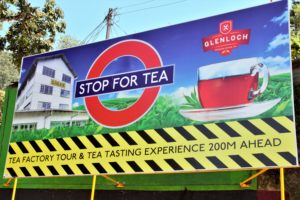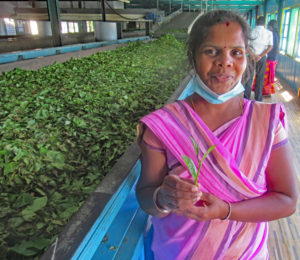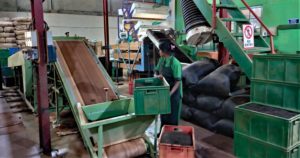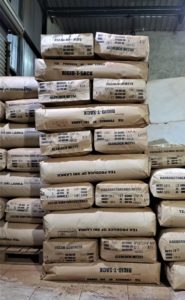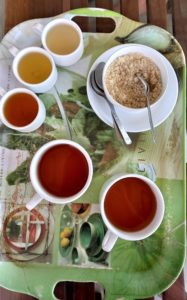Ceylon tea is world renown and on route from Nuwara Eliya to Kandy, we passed several tea estates, many which offered free tours and tastings. We chose the Glenloch Tea Estate to explore the various processes involved from plucking to cup.
Our guide, elegant in a beautiful sari, firstly explained the seven factory processes: withering, rolling, roll breaking, fermenting, drying, grading and packing. A tour around the factory, which runs seven days a week, allowed us to see each process in action.
Upstairs were two conveyor belts of withering leaves: one picked the day before and fresher leaves picked that morning.
Back downstairs, lots of noisy machinery was being operated mainly by barefooted women. A museum piece, a hand-operated circular rapid roller, was manufactured by Marshall Sons and Co Ltd in Gainsboro, England. Our guide told us that her grandfather had used the machine before the process was mechanised.
After seeing each process, we finally got to the packing section with its neatly stacked, large brown sacks of tea, before arriving in a small room which had samples of the four teas produced, starting with BOP or Broken Orange Pekoe, Orange Pekoe, Pekoe and Golden Flush.
Tour over, it was tasting time where we were brought five cups of tea ranging from very pale through to very dark.
Tasting over, we exited via the shop and bought green tea bags (our favoured variety) and a packet of loose black tea with ginger which sounded interesting.
Before leaving, we visited the rest rooms which had an interesting London Underground sign and the word ‘toilet’ in various languages.
When we got home, we looked at photos from a previous trip to Sri Lanka and found we’d visited the same tea estate in 2007. Neither or us realised at the time.
